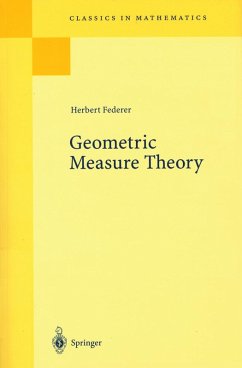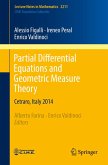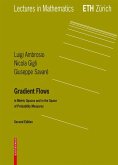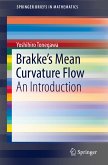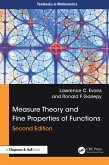Herbert Federer
Geometric Measure Theory (eBook, PDF)
44,95 €
44,95 €
inkl. MwSt.
Sofort per Download lieferbar

22 °P sammeln
44,95 €
Als Download kaufen

44,95 €
inkl. MwSt.
Sofort per Download lieferbar

22 °P sammeln
Jetzt verschenken
Alle Infos zum eBook verschenken
44,95 €
inkl. MwSt.
Sofort per Download lieferbar
Alle Infos zum eBook verschenken

22 °P sammeln
Herbert Federer
Geometric Measure Theory (eBook, PDF)
- Format: PDF
- Merkliste
- Auf die Merkliste
- Bewerten Bewerten
- Teilen
- Produkt teilen
- Produkterinnerung
- Produkterinnerung

Bitte loggen Sie sich zunächst in Ihr Kundenkonto ein oder registrieren Sie sich bei
bücher.de, um das eBook-Abo tolino select nutzen zu können.
Hier können Sie sich einloggen
Hier können Sie sich einloggen
Sie sind bereits eingeloggt. Klicken Sie auf 2. tolino select Abo, um fortzufahren.

Bitte loggen Sie sich zunächst in Ihr Kundenkonto ein oder registrieren Sie sich bei bücher.de, um das eBook-Abo tolino select nutzen zu können.
- Geräte: PC
- ohne Kopierschutz
- eBook Hilfe
- Größe: 46.06MB
Andere Kunden interessierten sich auch für
![Partial Differential Equations and Geometric Measure Theory (eBook, PDF) Partial Differential Equations and Geometric Measure Theory (eBook, PDF)]() Alessio FigalliPartial Differential Equations and Geometric Measure Theory (eBook, PDF)60,95 €
Alessio FigalliPartial Differential Equations and Geometric Measure Theory (eBook, PDF)60,95 €![Variational Principles of Continuum Mechanics with Engineering Applications (eBook, PDF) Variational Principles of Continuum Mechanics with Engineering Applications (eBook, PDF)]() V. KomkovVariational Principles of Continuum Mechanics with Engineering Applications (eBook, PDF)72,95 €
V. KomkovVariational Principles of Continuum Mechanics with Engineering Applications (eBook, PDF)72,95 €![Research Topics in Analysis, Volume II (eBook, PDF) Research Topics in Analysis, Volume II (eBook, PDF)]() Shouchuan HuResearch Topics in Analysis, Volume II (eBook, PDF)60,95 €
Shouchuan HuResearch Topics in Analysis, Volume II (eBook, PDF)60,95 €![Gradient Flows (eBook, PDF) Gradient Flows (eBook, PDF)]() Luigi AmbrosioGradient Flows (eBook, PDF)88,95 €
Luigi AmbrosioGradient Flows (eBook, PDF)88,95 €![Brakke's Mean Curvature Flow (eBook, PDF) Brakke's Mean Curvature Flow (eBook, PDF)]() Yoshihiro TonegawaBrakke's Mean Curvature Flow (eBook, PDF)56,95 €
Yoshihiro TonegawaBrakke's Mean Curvature Flow (eBook, PDF)56,95 €![Measure Theory and Fine Properties of Functions (eBook, PDF) Measure Theory and Fine Properties of Functions (eBook, PDF)]() Lawrence C. EvansMeasure Theory and Fine Properties of Functions (eBook, PDF)73,95 €
Lawrence C. EvansMeasure Theory and Fine Properties of Functions (eBook, PDF)73,95 €![Geometric Quantization in Action (eBook, PDF) Geometric Quantization in Action (eBook, PDF)]() N. E. HurtGeometric Quantization in Action (eBook, PDF)80,95 €
N. E. HurtGeometric Quantization in Action (eBook, PDF)80,95 €-
-
-
Produktdetails
- Verlag: Springer Berlin Heidelberg
- Seitenzahl: 677
- Erscheinungstermin: 25. November 2014
- Englisch
- ISBN-13: 9783642620102
- Artikelnr.: 53174150
Dieser Download kann aus rechtlichen Gründen nur mit Rechnungsadresse in A, B, BG, CY, CZ, D, DK, EW, E, FIN, F, GR, HR, H, IRL, I, LT, L, LR, M, NL, PL, P, R, S, SLO, SK ausgeliefert werden.
- Herstellerkennzeichnung Die Herstellerinformationen sind derzeit nicht verfügbar.
Biography of Herbert Federer
Herbert Federer was born on July 23, 1920, in Vienna. After emigrating to the US in 1938, he studied mathematics and physics at the University of California, Berkeley. Affiliated to Brown University, Providence since 1945, he is now Professor Emeritus there. The major part of Professor Federer's scientific effort has been directed to the development of the subject of Geometric Measure Theory, with its roots and applications in classical geometry and analysis, yet in the functorial spirit of modern topology and algebra. His work includes more than thirty research papers published between 1943 and 1986, as well as this book.
Herbert Federer was born on July 23, 1920, in Vienna. After emigrating to the US in 1938, he studied mathematics and physics at the University of California, Berkeley. Affiliated to Brown University, Providence since 1945, he is now Professor Emeritus there. The major part of Professor Federer's scientific effort has been directed to the development of the subject of Geometric Measure Theory, with its roots and applications in classical geometry and analysis, yet in the functorial spirit of modern topology and algebra. His work includes more than thirty research papers published between 1943 and 1986, as well as this book.
Introduction Chapter 1 Grassmann algebra 1.1 Tensor products 1.2 Graded algebras 1.3 Teh exterior algebra of a vectorspace 1.4 Alternating forms and duality 1.5 Interior multiplications 1.6 Simple m-vectors 1.8 Mass and comass 1.9 The symmetric algebra of a vectorspace 1.10 Symmetric forms and polynomial functions Chapter 2 General measure theory 2.1 Measures and measurable sets 2.2 Borrel and Suslin sets 2.3 Measurable functions 2.4 Lebesgue integrations 2.5 Linear functionals 2.6 Product measures 2.7 Invariant measures 2.8 Covering theorems 2.9 Derivates 2.10 Caratheodory's construction Chapter 3 Rectifiability 3.1 Differentials and tangents 3.2 Area and coarea of Lipschitzian maps 3.3 Structure theory 3.4 Some properties of highly differentiable functions Chapter 4 Homological integration theory 4.1 Differential forms and currents 4.2 Deformations and compactness 4.3 Slicing 4.4 Homology groups 4.5 Normal currents of dimension n in R(-63) superscript n Chapter 5 Applications to thecalculus of variations 5.1 Integrands and minimizing currents 5.2 Regularity of solutions of certain differential equations 5.3 Excess and smoothness 5.4 Further results on area minimizing currents Bibliography Glossary of some standard notations List of basic notations defined in the text Index
Introduction Chapter 1 Grassmann algebra 1.1 Tensor products 1.2 Graded algebras 1.3 Teh exterior algebra of a vectorspace 1.4 Alternating forms and duality 1.5 Interior multiplications 1.6 Simple m-vectors 1.8 Mass and comass 1.9 The symmetric algebra of a vectorspace 1.10 Symmetric forms and polynomial functions Chapter 2 General measure theory 2.1 Measures and measurable sets 2.2 Borrel and Suslin sets 2.3 Measurable functions 2.4 Lebesgue integrations 2.5 Linear functionals 2.6 Product measures 2.7 Invariant measures 2.8 Covering theorems 2.9 Derivates 2.10 Caratheodory's construction Chapter 3 Rectifiability 3.1 Differentials and tangents 3.2 Area and coarea of Lipschitzian maps 3.3 Structure theory 3.4 Some properties of highly differentiable functions Chapter 4 Homological integration theory 4.1 Differential forms and currents 4.2 Deformations and compactness 4.3 Slicing 4.4 Homology groups 4.5 Normal currents of dimension n in R(-63) superscript n Chapter 5 Applications to thecalculus of variations 5.1 Integrands and minimizing currents 5.2 Regularity of solutions of certain differential equations 5.3 Excess and smoothness 5.4 Further results on area minimizing currents Bibliography Glossary of some standard notations List of basic notations defined in the text Index
